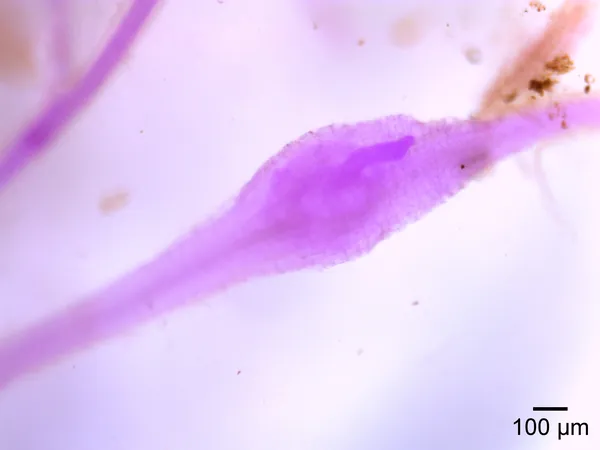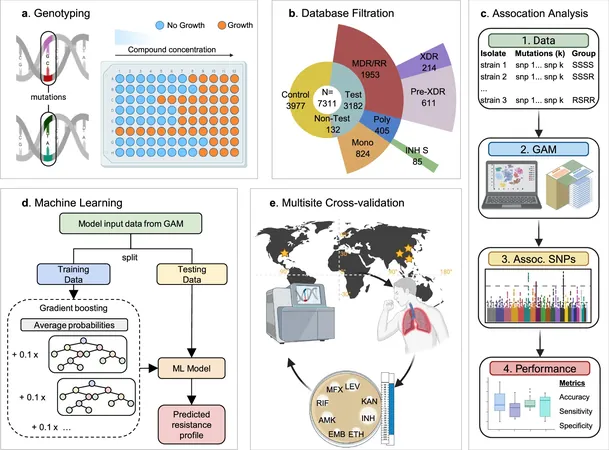
Shocking Discovery: Root-knot Nematodes Help Cabbage Root Flies Thrive!
2025-03-27
Author: Jia
Groundbreaking Study Unveils Alliance Between Agricultural Pests
In a groundbreaking study published in the esteemed journal Plant Physiology, researchers have revealed an astonishing underground alliance between two agricultural pests that could change the game in pest management. When field mustard plants are infected by root-knot nematodes, they unwittingly modify their defense systems, ultimately giving cabbage root flies an unexpected advantage.
Research Findings
Using advanced bioassays and ecometabolomic analyses, a team of scientists led by Axel Touw, Jessil Pajar, and Nicole van Dam discovered that field mustard (Brassica rapa) plants infected with root-knot nematodes (Meloidogyne incognita) saw a staggering 1.5 times more adult cabbage root flies (Delia radicum) emerging compared to their uninfected counterparts. This surprising finding indicates that despite having no direct physical interactions, these two pests can profoundly influence one another through the host plant they both exploit.
Chemical Defense Alterations
The key to this unexpected relationship lies in the restructuring of the plant's chemical defenses. The nematodes trigger a change in the production of glucosinolates—sulfur-rich compounds integral to plant defenses found in crucifers. Specifically, the nematode-inflicted plants increased their production of indole glucosinolates, while the levels of aliphatic glucosinolates, known to inhibit the development of root flies, decreased by a range of 10% to 25%. This alteration in chemical composition suggests a complex antagonistic interaction between the biosynthetic pathways of these compounds, leading to the unexpected boost for cabbage root flies.
Implications for Pest Management
Dr. Axel Touw emphasizes the implications of these findings: “Our study shows that complex interactions between belowground herbivores can significantly alter plant chemistry. Such indirect effects could either intensify or alleviate pest damage in crops, which is particularly vital for sustainable agriculture and integrated pest management strategies.”
Significance Beyond Curiosity
The research underscores the significance of plant-mediated interactions among soil-dwelling organisms, suggesting that root-knot nematodes, being highly prevalent in soils, are often the first invaders to establish contact with plants. The implications of this discovery extend beyond mere curiosity; as agricultural systems evolve, understanding these interactions will be crucial for designing effective pest management strategies, especially in ecosystems housing multiple root-feeding organisms.
Future Perspectives
As farmers and agricultural scientists grapple with the challenges posed by rising pest populations, these insights could pave the way for innovative solutions to protect crops and ensure sustainable practices in agriculture. It's time to rethink how we approach pest management in the field!





 Brasil (PT)
Brasil (PT)
 Canada (EN)
Canada (EN)
 Chile (ES)
Chile (ES)
 Česko (CS)
Česko (CS)
 대한민국 (KO)
대한민국 (KO)
 España (ES)
España (ES)
 France (FR)
France (FR)
 Hong Kong (EN)
Hong Kong (EN)
 Italia (IT)
Italia (IT)
 日本 (JA)
日本 (JA)
 Magyarország (HU)
Magyarország (HU)
 Norge (NO)
Norge (NO)
 Polska (PL)
Polska (PL)
 Schweiz (DE)
Schweiz (DE)
 Singapore (EN)
Singapore (EN)
 Sverige (SV)
Sverige (SV)
 Suomi (FI)
Suomi (FI)
 Türkiye (TR)
Türkiye (TR)
 الإمارات العربية المتحدة (AR)
الإمارات العربية المتحدة (AR)